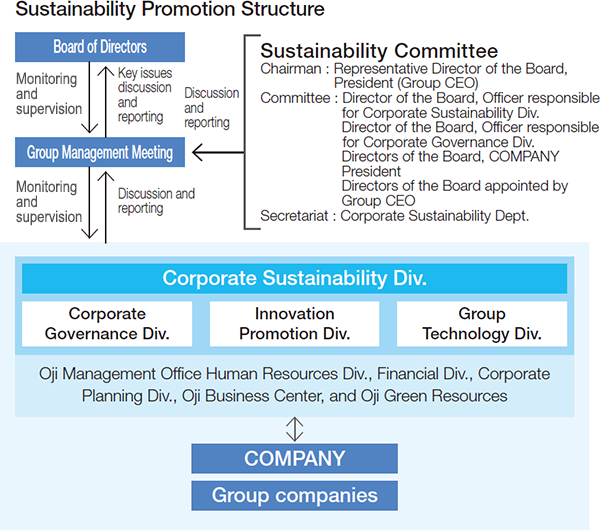Recognizing efforts for sustainability as one of the important management challenges, the Oji Group established the Sustainability Committee and the Corporate Sustainability Division in April 2022. We deliberate matters that are material to fulfilling our commitment to sustainability through the Sustainability Committee (Chairperson: Group CEO, Members: All Company Presidents and others) and monitored and supervised by our Board of Directors.
The Sustainability Committee, chaired by the Representative Director of the Board, President of Oji Holdings Corporation (Group CEO) and consisting of Directors of Oji Holdings Corporation (including Presidents of all COMPANIES), who is responsible for overall sustainability including climate change, discusses the Group’s risks associated with sustainability and measures against those risks biannually. Matters discussed at the Committee are referred for discussion and reported to the Group Management Meeting depending on the importance, and after deliberation by the Meeting, the Board of Directors makes a decision on execution of matters. In FY2022, the Group CEO appointed a female Independent Outside Director as a new member of the Committee.
The Corporate Sustainability Division, which integrates the Group's sustainability management, identifies sustainability-related risks and opportunities across the Group. In order to properly manage these risks and opportunities, the division disseminates them throughout the Group through risk-specific subcommittees consisting of the COMPANIES and subsidiaries, and reports monthly to the responsible division director and twice a year to the Group Management Meeting. Significant risks and opportunities are reported to the Board of Directors based on the judgment of the division director. In addition, as the secretariat of the Sustainability Committee, the Corporate Sustainability Division carries forward matters determined by the Committee.

The Oji Group screens investments and loans, such as those for new businesses and projects, not only by examining economic aspects but also from the viewpoint of ESG (environment, social, governance) by following the Oji Group Corporate Code of Conduct, the Oji Group Behavior Standard, the Oji Group Sustainability Action Guidelines for Supply Chains, and other criteria.
| Occupational Safety and Health | We conduct risk assessment by confirming our safety and health policies, objectives, and management structure, the occurrence of occupational accidents resulting in incapacity for work lasting at least one day, including accidents resulting in deaths or serious injuries, and countermeasures taken against such injuries, daily safety and health activities such as safety patrols and safety training, and safety of machines, equipment, chemicals, work environment, work methods, and others, not to mention the status of compliance with laws and regulations related to safety and health. |
|---|---|
| Water | To assess and identify water-related risk, we use WRI Aqueduct* and conduct due diligence on precipitation, drought, water disasters, water-related laws and regulations, and other elements of the area where we plan to launch a new project or business.
|
| Biodiversity | In the planning phase of a new business or M&A, we collect information by meeting with local governments and environmental NGOs of the respective areas, and assess biodiversity risk. |
| Human Rights | We conduct risk assessment to see whether consideration is given to basic human rights and check for elements that have a negative impact on human rights, with a special focus on child labor, labor management, the rights of indigenous people, labor-management relationships, and other factors. |
| Anti-Corruption | We conduct risk assessment of our business partners as well as our agents to confirm that they do not engage in any bribery, illegal trade, or misconduct. |
For information on risk assessment of the supply chain, please click here.
Existing businesses and projects are subject to regular audits by the Internal Audit Department, Safety Administration Department, and Corporate Sustainability Department.
We check the status of basic working conditions and workplace safety environment, not only for domestic group companies but also for overseas group companies, which may lead to human rights risks.
Where a risk is found, guidance for improvement is provided and shared across the Group.